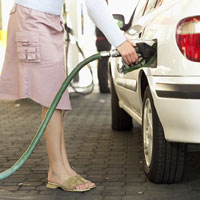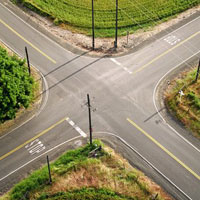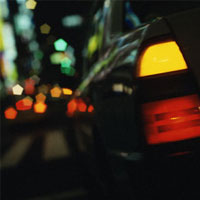On the Road Bahanian Style
by
Faith Foyil
It's
probably no coincidence that a nearby gas station is situated
next to a branch of the Royal Bank of Canada. You visit
the bank and secure a loan. Then you fill up your tank.
Americans freak when the price of gas hovers around $2.00
a gallon. That bargain rate would prompt pump stampedes
here in the Bahamas where, as I write, gasoline sells for
$3.54 a gallon.
In the Bahamas and other islands like Bermuda, we drive
on the left side of the road. This transportation novelty
was originated during the time of the former British government.
The Brits probably still get a big kick out of how thoroughly
this practice confuses American tourists. Such jokesters,
those British!
 |
|
British
gas was, in reality, a magical elixir called
petrol. They poured itl out in cute little
measurements they called litre |
I
first became acquainted with high gas prices and driving
on the wrong, er, left side of the road, when we lived in
Great Britain in the early '90s. The Brits, reinforcing
their "stiff upper lip" stereotype, didn't complain
about their exorbitant fuel prices. They, nonetheless, obviously
felt obliged to disguise these high rates from unsuspecting
tourists by convincing us that British gasoline was, in
reality, a magical elixir called petrol. They poured this
petrol out in cute little measurements they called litres,
which certainly fooled this American Woman for a long time.
Navigating
a car down a country road in Britain could often mean a
narrow escape. The bramble bush scratches down both sides
of my right-hand drive Talbot Horizon was proof of how often
I was incorrectly led to believe I could easily maneuver
a 5'6" vehicle down a six-foot-wide lane with a steering
wheel that was, for some reason, positioned on the passenger
side of the front seat.
I
would sweat bullets while driving down lots of those bushy
lanes. While navigating, I was also simultaneously trying
to keep in mind that my car hood was a bonnet, my trunk
a boot, and the upcoming highway a carriageway. Automatic
transmission was such a rarity that unless you could operate
a manual transmission, or gearbox, you'd have to thumb a
ride on a coach, which, I learned, was a bus, not a designer
pocketbook.
 |
When
you reach a four-stop, lightless intersection you
will be playing Car Tag, a game with no set rules. |
At
least the electricity never went out, which it does here
in the Bahamas on a regular basis. It can be a challenge
to maneuver during an island-wide black out. You reach a
four-stop, lightless intersection and play Car Tag, a game
with no set rules. You honk horns, gesticulate hands, and
nod heads emphatically to each other making "You go,
No, YOU go, No, I want YOU to go first" motions at
other equally indecisive drivers.
Bahamians
drive on the left but they chiefly import their cars from
the U.S., which means the steering wheels are also on the
left. Passing is undertaken to the right. Stop and picture
this all for a moment before continuing, please.
Drivers
here must develop contortionist-like skills in order to
overtake slow vehicles. Many Bahamians, friendly and trusting
souls, choose not to worry about oncoming traffic at all.
They fly out of line and pass two, three, or more vehicles,
assuming that the equally friendly and trusting drivers
they're passing will simply let them squeeze back in when,
seconds into the overtake, they are faced with a line of
oncoming traffic they didn't check to see was headed their
way.
I've
driven in several countries and conclude that Bahamians
are indeed among the most considerate drivers in the world.
Many Bahamians think nothing of suddenly stopping in the
middle of a busy road to chat with a friend they've spotted
walking on the shoulder - even if there are six cars in
back of them quite eager to continue their journey.
Even
"jitney" bus drivers go out of their way to accommodate
their passengers, picking them up and dropping them off
where and when they please, regardless if it's at an authorized
bus stop designation. The driver in the car behind slams
on his or her brakes because of this unexpected sojourn
but recognizes that the bus driver must be a really nice
guy.
 |
Blinkers,
or indicators as they're known in Britain, don't seem
to be obligatory to Bahamians. |
Blinkers,
or indicators as they're known in Britain, don't seem to
be obligatory. A Bahamian driving in front of you may simply
slow down and turn rather than waste energy indicating left
or right in advance. You may also be fooled into thinking
drivers are simply decelerating in order to adjust radio
volume, or maybe to answer cell phones, since you don't
see any indicative brake lights which perhaps haven't operated
for a few months. Slam on your own brakes and - oops --
Junior spills a milkshake all over your back seat. You should
have been paying more attention!
There
are ten basic rules you should learn before driving in the
Bahamas:
1. Murphy's Bahamian Auto Law states that if you're driving
a new vehicle three mph over the speed limit, you will be
stopped and ticketed, regardless of the guy in the '89 Chevy
pickup that just passed you spewing out toxic levels of
pollutants.
2. Try not to stumble onto an accident scene, festival, roadwork
site, or parade. Bahamians will slow down to a crawl in
order to mentally record every detail with which to later
regale friends and family. Since there are often accidents,
festivals, roadwork sites, and parades, you might simply
consider leaving a novel in your glove compartment or packing
a cooler of soft drinks and snacks in the car for emergency
use. Or simply staying home.
3. Don't worry about being stuck on a little side street trying
to pull out onto a busy main artery. The Bahamian on the
main road will cordially stop to let you in, regardless
of the fact he has the right of way. He'll not only let
YOU in but also the five cars behind you as well, even if
there are seven vehicles behind him wondering why there's
a hold up.
4. A gas mask in the glove compartment may come in handy when
you're stuck in traffic behind a slow-moving Payloader whose
exhaust system was checked as recently as 1962.
5. Honk your horn and wave at honeymooning, helmet-less moped
riders. Make sure you get a glimpse of their smiling, sunburned
faces before they crash into the rocks up ahead and are
whisked away by ambulance.
6. The Bahamian Road and Traffic Department people, like the
British, are incredible practical jokers. They often place
vague signs on the road that read "Slow Men at Work,"
to make you wonder whether they mean "Slow down, men
are working here," or the more disparaging "Wow,
these guys are really slow." Always be on guard. You
may also stumble on what's clearly a roadwork site with
no ambiguous "Slow Men at Work" sign at all. Try
not to commit unintentional manslaughter by running over
the phone company worker when he pops out of a manhole in
the middle of the road to eat his lunch.
7. Save yourself aggravation by avoiding accidents with vehicles
that look like they were recently imported from a south
Florida Demolition Derby. The odds are good the driver won't
have bothered with the time-consuming process of obtaining
a license or insurance. Or perhaps even brakes.
8. Many roads post signs with different speed limits for cars
(45 mph) and trucks (30 mph). But there is only ONE driving
lane. If you decide to try to pass a bulldozer who's crawling
at 18 mph, there's a good chance you'll be smashed by the
oncoming angered driver on the other side of the road who's
attempting to pass a bulldozer in front of him.
9. Don't tailgate too long behind the local family pulling
out of Nassau International Airport following their Miami
shopping trip. The five duffel bags and three boxes precariously
dangling out of their trunk may dislodge, leaving you with
miscellaneous clothing, a color TV, virgin truck tires,
new pairs of "tennis" (sneakers), cases of formula,
bulk-sized soap powder cartons, diapers and new bed linen
crashing down onto your front hood.
10. Don't worry if your muffler's corroded. Your seven-second
annual car inspection may cost over $100 and require a morning
of paperwork after a long, hot wait in line, but your only
requirements will be a horn that honks, lights that turn
on and off, and an emergency brake handle that coordinates
with your interior car decor.
|